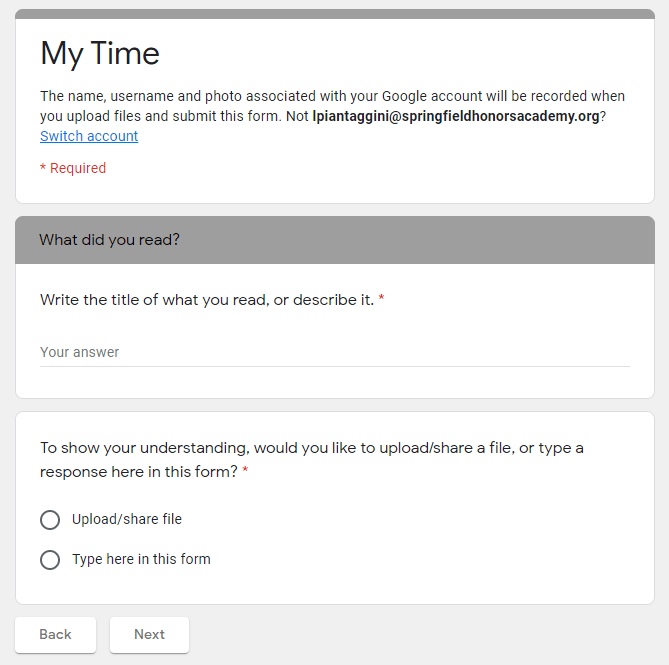“Why are students failing?” Or, more specifically, “why are teachers failing students, especially in a pandemic?” A question like that was asked on Twitter sometime last month, and I had a fairly simple take on the matter: teachers didn’t adjust expectations. Sure, kids might not be “doing the work,” but it’s teachers who determine evidence of learning that comprises “the work” in the first place. Our reality is that most evidence of learning we used to get just isn’t possible remotely, or there are significant obstacles in the way. Bottom line, teachers have set expectations that not every student can meet. Even though I anticipated this, my expectations still needed adjusting, too. First, here’s a brief rundown of problems that lead to the “My Time” solution…
Absent/Late
Despite using just one Google Form to collect “the work”—once a week like clockwork—there were students who weren’t in class at all, who stepped away from the computer when we had a quick quiz, or who were so late catching up because…pandemic…that there wasn’t anything they could complete on their own time. Of course, inventing busywork that could be completed outside of class helps no one, but it turns out my way of collecting evidence of learning was only useful for the students present, receiving input. This makes sense. There really is no substitute for class, but it dawned on me before holiday break that many of our classes are now reading and processing Latin together using texts with full glossaries. With all those resources available online, it’s quite possible to do this outside of class, and it might be easier for a host of reasons we don’t need to get into. Students very well might be able to receive target language input—during a pandemic—at a time other than my scheduled class. If that’s the case, then it’s unconscionable to fail a student because of in-person collection of “the work,” only. It’s gotta be more flexible.
Don’t get me wrong, I’m not so naïve as to pretend students who don’t attend class will acquire and learn as much as their peers, but pandemic expectations must be adjusted, and there’s no way around that. One strategy in second language teaching I got from TPRS (Teaching Proficiency through Reading and Storytelling) is to identify a “barometer student,” which is the slowest processing student used to gauge comprehension (i.e. if they get it, the class gets it). Teaching in a way that the barometer student understands is the baseline of all comprehension-based practices. Let’s take a cue from this. I propose “the work” of pandemic learning looks the same: identify what the student who’s faced with the most obstacles can give as evidence of learning, then set that as the base expectation of “the work” for grading. And like most accommodations and adjustments, this just ends up being good teaching for whenever remote learning isn’t necessary any longer.
My Time
Students need input, above all else, and they can receive it outside of class, especially when language learner materials are used (vs. “authentic” texts without any support). Now, attached to each Google Classroom weekly assignment is an optional form students use if they were absent, or don’t have anything to turn in from class. I don’t need to know why, either. Pandemic, right? So, students can still get Latin class credit by a) sharing what they read, and b) showing their understanding. It looks like this:
The responses I’ve been getting, especially from students who have otherwise been far off the map, do actually show that they’ve been doing “the work” of reading after all. This is something an in-class-only, and/or deadline system wouldn’t allow. Is your grading system flexible enough to accommodate the pandemic?

I have the same dilemma – this is a great idea. What are you looking for in responses? Are you getting responses in English, showing comprehension of the Latin?
Oh god, not in target language. I teach 9th grade first year language students who have had 28 classes as of yesterday. I wouldn’t expect them to express themselves in the TL.
I’ve been getting everything from quick character descriptions, to summaries, to preference and thoughts about what they read. The latter are my favorite to read.
I love how you reflected on your already adjusted expectations and…re-adjusted to be realistic. This is great post!